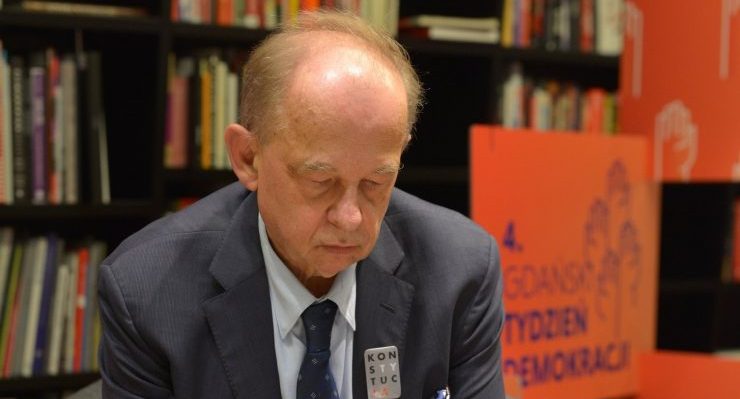
An academic at the University of Sydney’s law school is facing a series of court cases in Poland over tweets criticising the government and a state broadcaster.
Wojciech Sadurski, a professor of jurisprudence and a world-renowned scholar of European constitutional law is facing civil and criminal defamation cases brought by Poland’s ruling conservative Law and Justice Party (PiS) and a state-run broadcaster TVP. On Wednesday, Sadurski, a joint Polish-Australian national, faces his first hearing in the District Court for Warsaw.
The case against Sadurski
Sadurski has been a fierce critic of Poland’s conservative populist ruling party since it came to power in 2015. In November last year, President Andrzej Duda addressed a mass rally led by far-right groups to commemorate the centenary of Poland’s independence.
In a tweet urging people to boycott the rally, Sadurski referred to the PiS as an “organised criminal group”, and criticised their closeness with white supremacists and neo-Nazis. PiS leader Jaroslaw Kaczyński, one of the most powerful people in Poland, launched a lawsuit against Sadurski, alleging he had defamed the party.
In January, Paweł Adamowicz, the progressive mayor of Gdańsk, was assassinated at a charity event. Sadurski, along with many commentators including Adamowicz’s widow, pointed the finger at TVP for their demonisation of the late mayor, whose outspoken advocacy for immigrants and LGBTIQ people put him at odds with Poland’s ruling party.
TVP threatened to sue anyone who connected them with Adamowicz’s murder. When Sadurski tweeted calling for people to boycott the “Goebbelsian” media company over their role in the mayor’s death, TVP brought both civil and criminal defamation claims against him.
If Sadurski loses the civil cases, he may have to pay PLN 20,000 (approximately AUD $7550) to a nominated charity, as well as any legal costs incurred by his opponents. PiS and TVP are also requesting Sadurski take out expensive online advertisements announcing his retraction, and be restrained from any further criticism.
A conviction on criminal defamation charges could bring further fines, and the (unlikely) possibility of a year in prison.
A high-profile critic
The legal harassment of Sadurski reveals PiS’s sensitivity to dissent. While he declined to comment for this piece, Sadurski wrote in a Washington Post opinion piece earlier this year that he had “become the target of autocrats who have weaponised the law against their opponents”.
Martin Krygier, a professor of law at the University of New South Wales and a long-term friend of Sadurski, said it is Sadurski’s considerable international profile and his willingness to ridicule PiS that has made him a target.
“He’s one of the few Polish expats who lives abroad, has a big profile, and criticised the government,” Krygier said.
“It’s annoying for them to be criticised by a person of that international renown.”
Sadurski has a considerable profile in Poland as an academic and political commentator. His academic work has also brought worldwide acclaim — he divides his time between the University of Sydney and the University of Warsaw, and is a regular visiting fellow at prestigious institutions like Yale.
Nearly 800 academics have signed an open letter in support of Sadurski. University of Sydney Vice-Chancellor Michael Spence also expressed support on behalf of the institution, and raised concerns about academic freedom in Poland.
“The right to freedom of expression and to criticise and engage in public debate without fear of legal or political harassment is a foundational value of liberal democracy and the rule of law and is protected under the European Convention on Human Rights, of which Poland is a signatory,” a statement from Spence said.
An illiberal turn
Since taking power in 2015, PiS’s attempts to radically transform public institutions have led to concerns about the erosion of democracy in Poland.
In 2016, Poland’s government handed control of TVP to a former PiS politician, who purged hundreds of journalists from the broadcaster and replaced them with party loyalists.
“With TVP, the model was once the BBC, but it’s now a very vulgar arm of government propaganda that goes after opponents, treats anyone who’s not with us as enemy,” Krygier says.
Poland’s judiciary has also been under relentless attack. The Constitutional Tribunal has been stacked with PiS picks, had its powers curtailed, and become increasingly dysfunctional. It took pressure from the EU to reverse a decision to purge the Supreme Court last year.
However the Eurosceptic PiS remains in a tussle with Brussels over its attempts to control the courts. A law passed earlier this year, which allows judges to be disciplined for their decisions, is being challenged in the European Court of Justice for violating the principle of judicial independence.
For Sadurski, all this is evidence of Poland’s slide towards authoritarianism. Last week, he was at Oxford, delivering a lecture on whether Poland is still a liberal democracy. A week later, his question may be answered in a Warsaw courtroom.








It would not surprise me at all if the piss party were setting up protection rackets for their preferred crooks. Hopefully they have a Polish Fitzgerald. Might take a while the way things are going there.
It is interesting that organisations can sue for defamation in Poland; I don’t think they can in Australia.